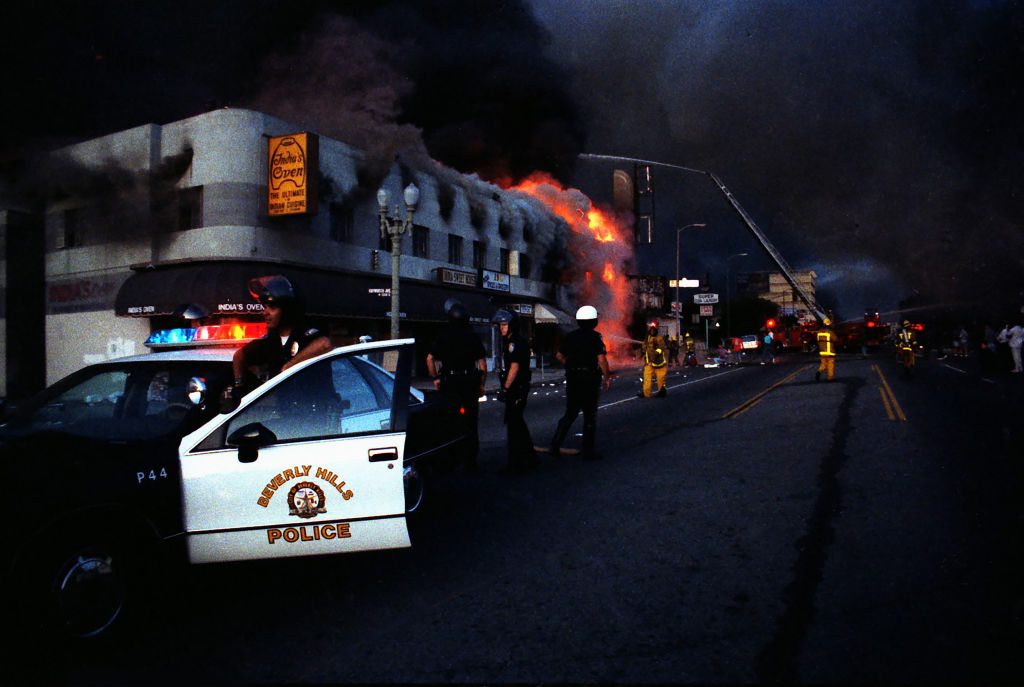Even by James Ellroy’s standards, the narrator of his latest novel is not a man much given to the quiet life. Freddy Otash breaks legs for Frank Sinatra. He gets Dean Martin’s pregnant Latina maid deported. He sticks the hand of someone blackmailing Liberace into a deep-fat fryer. He sleeps with the 21-year-old Elizabeth Taylor while she’s only on her second marriage. And all that’s in the first 20 pages, while Otash is still an LA cop. Once he goes freelance as a private eye, things turn rather more lurid.
Widespread Panic is a rare stand-alone novel among Ellroy’s assorted trilogies and quartets. But, as you can maybe tell already, that doesn’t necessarily make it a radical departure. Otash himself — a real-life character in 1950s Hollywood — showed up in the Underworld USA trilogy and was the protagonist of the 2012 online novella Shakedown, of which the new book is an (extravagantly) extended version. Moreover, pretty much all of Ellroy’s methods and concerns are so fully present and correct that the result — not for the first time in his fiction — often feels close to self-pastiche.
As a private eye, Otash works for Confidential, the all-powerful scandal magazine referred to in the title of Ellroy’s best-known book, L.A. Confidential. By bugging selected bedrooms in every upmarket hotel in the city, and by bribing the staff to ensure that movie stars choose the rooms in question, Otash keeps Confidential fully informed of who’s having sex with whom — especially if the sex is gay, interracial or features an unusually large penis (penile size being another abiding Ellroy interest). Either that, or he extorts money to kill the story.
Not that this prevents Otash from passing on those stories to us. Among many, many other things, we’re told that Burt Lancaster owned a sexual torture den and that James Dean once gave a private screening of a porn film he’d made to an audience that included Ronald Reagan and Jean-Paul Sartre.
Such gossiping about the famous dead is by no means new in Ellroy’s work. Once again, though, it’s unclear not just how much of it is true, but also how much is supposed to be. ‘Absolute fact interests me not one whit,’ he’s said. Yet I’m not sure that the same applies to his readers, many of whom might find that their reading here is regularly interrupted by some serious Googling.
Then again, this is perhaps not a novel that you’d race through anyway. While the action remains propulsive, the overall atmosphere impeccably sleazy and the intertwining of plots as deft as ever, sentence by sentence the book is something of a slog — and for one obvious reason. Virtually every one of those sentences is almost pathologically alliterative.
Of course, a fondness for alliteration has never been difficult to detect in Ellroy’s previous work. But never before can he — or anybody else who’s not a medieval poet — have cranked it up this far. The official reason seems to be that Otash is replicating the prose style of Confidential, with its unending quest for ‘quivering queers, jittery junkies, dipsos deep in the DTs’. Yet, over 320 pages, it becomes a tic so distracting that you realize you’re not always noticing what he’s using it to say. I also imagine that even a Confidential reporter might occasionally have written ‘I dozed off’ rather than‘I summoned seconds of safety and solace and slid into sleep’ — or ‘I felt unhappy’ instead of ‘I was laid low, bent bare, and stripped to striation on the Isle of Deep Despair’. To maintain his near-perfect alliteration strike rate, Ellroy also requires tautology (‘satedly satisfied’) and some lucky place names: at one point, two young men Otash has beaten up, ‘mewed for their mamas in Miami and Milwaukee’.
Granted, Ellroy is such a force of nature that wishing he’d tone it down a bit is not unlike wishing a hurricane wouldn’t blow quite so strongly. In theory, too, the sheer bloody-mindedness with which he sustains the alliteration is sort of impressive. Even so, that doesn’t stop one from thinking how much better Widespread Panic might have been if only Ellroy had, well, toned it down a bit.
This article was originally published in The Spectator’s UK magazine. Subscribe to the World edition here.

























